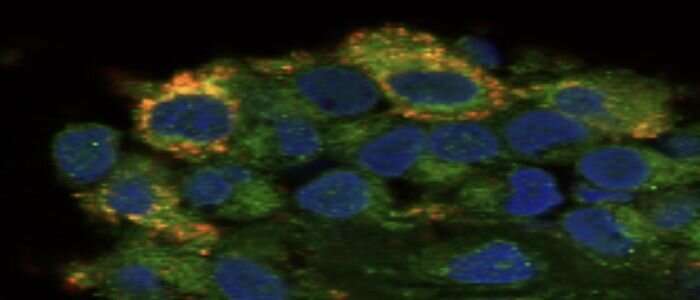Joint cell finding gives clues for improved treatment of rheumatoid arthritis

The key to swift treatments to cure the pain of rheumatoid arthritis has been found in the joints of people with the condition who are in long-term remission.
The study—published today in Nature Medicine and led by the University of Glasgow in collaboration with Fondazione A.Gemelli IRCCS in Italy and the Versus Arthritis funded Research into Inflammatory Arthritis Center (RACE)—found that people with arthritis in long-term remission had a difference in cell function which could settle inflammation and “teach” nearby cells to repair the joint.
Although treatment for rheumatoid arthritis has improved, some people with the condition do not respond well with many having unpredictable “flare-ups” of the disease. Scientists now hope that by harnessing the benefit of these “resolving” cells it could lead to new and more effective treatments.
The study looked at high resolution molecular images of the joints of people with rheumatoid arthritis in long-term remission. The researchers found that the membrane that protects and lubricates their joints appeared normal in these patients, in contrast to the inflamed, swollen joints of severe arthritis. The researchers found a crucial difference in the functions of cells called macrophages between patients in disease remission compared to patients with active arthritis. In active arthritis these macrophages arrived from blood and caused inflammation and joint damage. People in long-term remission had a different type of macrophage that could resolve inflammation and instruct adjacent cells to repair the joint.
Lead author Dr. Mariola Kurowska-Stolarska, from University of Glasgow and RACE, said: “The result of this study is a credit to the vision and teamwork of our multinational collaborators. We identified different types of macrophages, and our goal now is to discover treatments that will encourage development of resolving macrophages in the joint.
“This would be a useful additional strategy to current treatments that calm-down the aggressive macrophages in arthritis. In the meantime, the relative numbers of resolving macrophages or aggressive macrophages in the synovium, or joint, might be a good predictor of flare and an indicator of arthritis patients maintaining remission.”
Prof Iain B McInnes, Director of the Institute of Infection, Immunity and Inflammation at the University of Glasgow and RACE, said: “For many years we have focussed our research efforts on the pathways that switch on inflammation in the joints of people with rheumatoid arthritis—and this new study is remarkable in showing us how natural resolution of inflammation occurs. This gives us new clues as to how we can best design new treatments to achieve remission -our long-standing goal!”
Source: Read Full Article


